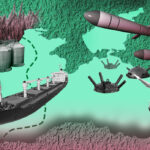While Ukraine and Israel are involved in distinct conflicts with varying capabilities and needs, some categories of essential weaponry may overlap, potentially leading to shortages if the conflicts persist, reports The New York Times.
Some of the supplies to Israel may include the same types of artillery and bombs that Ukraine relied on during its 20-month ground war against Russia to defend its territory. Primarily, this pertains to 155mm artillery ammunition, a NATO standard.
According to The New York Times, the United States has already provided Ukraine with over 2 million rounds of such projectiles, and European countries have additionally delivered hundreds of thousands of munitions of this calibre.
With the outbreak of war in Israel, the publication adds, tens of thousands of such munitions could also be provided to Israel for a potential ground operation in the Gaza sector.
Since the beginning of the year, the United States has been dispatching these munitions to Ukraine from its depots located in Israel. However, a portion of them will now be utilized in Israel.
However, American officials have not disclosed specific details regarding the quantity of these projectiles to be supplied to both countries, emphasizing that they will provide the “necessary” amount.
Depending on the duration of the war in Israel, achieving this might be challenging, potentially leading to “compromises,” according to Mark Cancian, a senior adviser at the Center for Strategic and International Studies in Washington, as noted by The New York Times.
Nonetheless, an unnamed U.S. Department of Defence representative cited by The New York Times noted that Israel and Ukraine may receive different variants of these munitions to “avoid duplication.” For example, Israel could obtain “precision munitions for targeting in densely populated urban areas,” while Ukraine might receive cluster munitions that could be “more effective against positions in open combat fields.”
Thus, as Michael Morell, the former deputy director of the Central Intelligence Agency quoted by the publication, pointed out, “there will be very little overlap between what we give Israel and what we give Ukraine.”
This does not entirely address the need for expediting the production of these and other munitions, which is currently being worked on by U.S. and European defence industries.
It is worth noting that recently, the United States officially began its work in Ukraine with the appointment of Robert Storch as a Defence Ministry Inspector. He will oversee the use of arms supplied to Ukraine.
All international allies have complete access to verifying the effectiveness of their weaponry’s use in Ukraine, where monitoring missions involving partner countries regularly function to carry out control and monitoring functions.
Source: The Gaze







